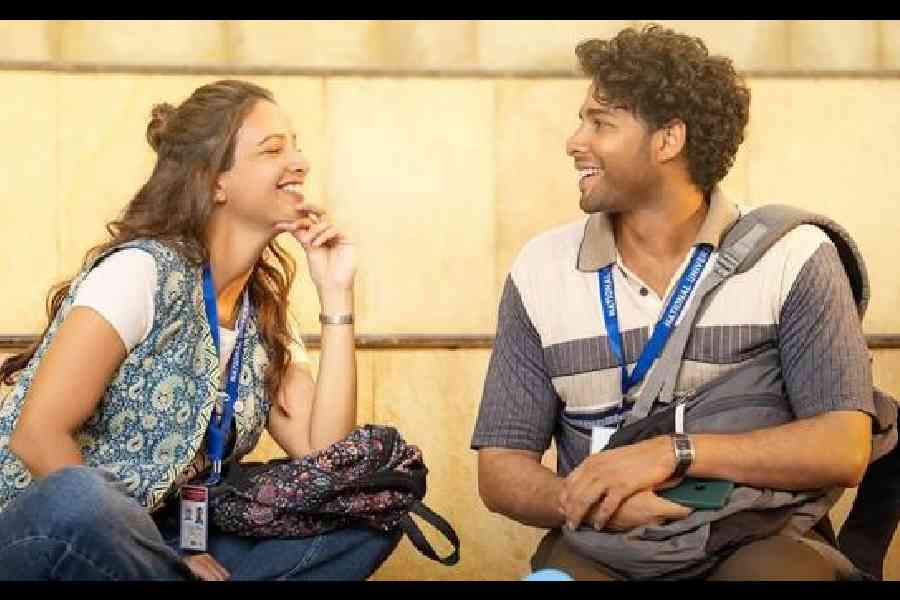Izzat. A loaded word that, in most parts of Indian society, sits heavy on women. Women need to dress a certain way, behave in a manner that is deemed fit by men (and also other women) and mingle sparingly with those of the opposite gender, mostly under the cognisance of the family. Men claim to be the upholders of izzat, but their actions — no matter how unlawful, bigoted or discriminatory — don’t seem to tarnish it in any way. This, unfortunately, is the truth of a large demographic of our population, fed as it is with archaic, often illegal notions of caste discrimination and pervasive gender roles.
The cock-a-snook attitude that Dhadak 2 throws at these ideas and practices hits hard — “bohot hard”. It is a mere coincidence that Siddhant Chaturvedi, who rose as MC Sher in Zoya Akhtar’s Gully Boy — yet another story of a marginalised talent fighting (or rapping) his way to the top — plays the leading man in this Shazia Iqbal-directed film.
Dhadak 2 is an adaptation — and refreshingly — not a remake of the much-lauded 2018 film Pariyerum Perumal, in which debutant director Mari Selvaraj poked hard, and finally tore apart caste bias and the violence that is perpetuated in its name. Despite its scathing central theme, Pariyerum Perumal — named after the film’s leading man, played by Kathir — played it subtle. The violence was spelt out but the protagonist’s handling of it — by choosing to keep it a secret from the woman (Jo, played by Anandhi) who was unwittingly the cause of it — eventually gave him power over the perpetrators, which included the father she doted on. The final walk, as two glasses of tea loomed in the foreground — the equivalent of breaking bread with the adversary, despite the differences that couldn’t and wouldn’t be erased even if one tried — was powerful.
Subtlety isn’t Dhadak 2’s strong suit. This approach — Iqbal pens the script along with Rahul Badwelkar — elevates the film in many ways, but also brings it down several notches in some instances. In the world we live in, one needs to make one’s voice heard, and that is what Dhadak 2 emphasises at every point. But while it does scream out discrimination in almost every scene, it falls short of the impact of the original, eventually degenerating into a standard rich girl-loves-poor-boy film.
The win of Dhadak 2, however, lies in the fact that here is a mainstream Hindi film that doesn’t shy away from bringing caste — and the ramifications of the bias attached to it — to the forefront. Dhadak 2 lays bare conversations about caste that are largely absent from the average Bollywood romance.
The spiritual sequel to Dhadak — that starred Ishaan Khatter and Janhvi Kapoor — is centred on Neelesh (Siddhant), a boy from a marginalised community who wants to become a lawyer. The discrimination that Neelesh has suffered in the past because of his surname stops him from saying it out loud. We aren’t told where Dhadak 2 is set, but Neelesh stays in the locality of Bhim Nagar, which spells out his background. His close friend in college turns out to be Vidhi Bhardwaj (Triptii Dimri), with the two eventually falling in love.
That starts a cycle of violence — more humiliating than visceral — that sets Neelesh on a war path. From the boy who enrolled in law school saying: “Padhne aaya hoon, ladne nahin”, Neelesh is compelled to fight in order to save himself, his people, his love, and most importantly, his self-worth in a world that constantly challenges it. In one scene, he sums it up as: “Koi na koi roz yaad dilata hain ki hum insaan nahi hain.”
Dhadak 2 compels you to think, which is more than one can say about most films in recent times. The two-minute disclaimer at the beginning is followed by a Thomas Jefferson quote: “When injustice becomes law, resistance becomes duty.” Dhadak 2 profoundly and skilfully carries forward that thought.
Unlike its Tamil original, there is a more solid establishment of the caste chasm and campus politics in Dhadak 2. Another distinct departure that the adaptation makes is that the romance is of a reciprocative nature here. That comes through even more impactfully courtesy a palpable performance from Triptii Dimri, who excels in her portrayal of a woman bound by society but unwilling to bow down to it. Siddhant (despite the hint of a brown face) is equally effective, and together the two actors bring alive scenes that probably were just passive words on paper.
The supporting ensemble — Saurabh Sachdeva, Anubha Fatehpuria, Vipin Sharma, Zakir Hussain, Harish Khanna — is equally strong, making Dhadak 2 a film that lingers on your senses much after the curtains come down.
I liked/ didn’t like Dhadak 2 because... Tell t2@abp.in











